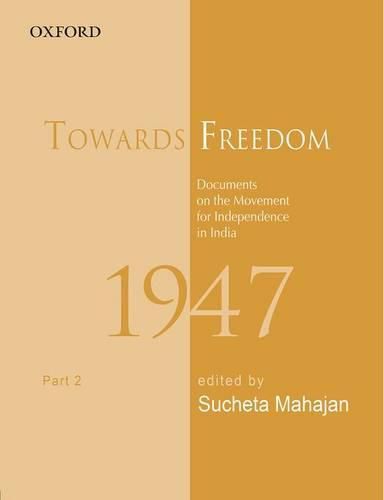Readings Newsletter
Become a Readings Member to make your shopping experience even easier.
Sign in or sign up for free!
You’re not far away from qualifying for FREE standard shipping within Australia
You’ve qualified for FREE standard shipping within Australia
The cart is loading…






The Towards Freedom series is an endeavour to document the years leading to Independence. It goes beyond the overtly political activities of the time and the notion of Independence as ‘transfer of power’. The volumes of this series underscore the fact that the struggle for Independence was not just about attaining freedom from a colonial power-it also comprised efforts to seek social justice, economic empowerment, and cultural autonomy. With meticulously selected historical material from 1937 to 1947, the volumes bring to the fore the activities, attitudes, and ideas of diverse sections of Indian society.
The 1947 volume, published in three parts, covers the major socio-political processes of that fateful year. The first part highlights the main political events that took place in the three-way conflict between imperialist, nationalist, and communal forces. The story continues in the second part, which takes up the partition award and the actual process of partition, the settlement of boundaries, the rehabilitation of refugees, and the developments in the princely states. The third part brings to the fore themes such as the future of the Congress, peasants’ and workers’ struggles, caste, minorities, language and literature, the position of women, the economic consequences of partition, foreign relations, and the celebrations of 15th August.
In this part, the second in the 1947 volume, the story of India’s independence and partition unfurls through documents ranging from newspapers, private papers, and letters, to speeches, maps, cartoons, and colonial archives. The documents relate to the Constituent Assembly, the partition award, partition in Bengal and Punjab, the referendum in the Northwest Frontier Provinces and Sylhet, and the princely states, as also those on the Interim Government and the India Independence Bill. This part also highlights the problem of communalism which became so pronounced in several regions of India during this period that even the parties which stood for unity, such as the Congress, had little option but to accept partition.
$9.00 standard shipping within Australia
FREE standard shipping within Australia for orders over $100.00
Express & International shipping calculated at checkout
The Towards Freedom series is an endeavour to document the years leading to Independence. It goes beyond the overtly political activities of the time and the notion of Independence as ‘transfer of power’. The volumes of this series underscore the fact that the struggle for Independence was not just about attaining freedom from a colonial power-it also comprised efforts to seek social justice, economic empowerment, and cultural autonomy. With meticulously selected historical material from 1937 to 1947, the volumes bring to the fore the activities, attitudes, and ideas of diverse sections of Indian society.
The 1947 volume, published in three parts, covers the major socio-political processes of that fateful year. The first part highlights the main political events that took place in the three-way conflict between imperialist, nationalist, and communal forces. The story continues in the second part, which takes up the partition award and the actual process of partition, the settlement of boundaries, the rehabilitation of refugees, and the developments in the princely states. The third part brings to the fore themes such as the future of the Congress, peasants’ and workers’ struggles, caste, minorities, language and literature, the position of women, the economic consequences of partition, foreign relations, and the celebrations of 15th August.
In this part, the second in the 1947 volume, the story of India’s independence and partition unfurls through documents ranging from newspapers, private papers, and letters, to speeches, maps, cartoons, and colonial archives. The documents relate to the Constituent Assembly, the partition award, partition in Bengal and Punjab, the referendum in the Northwest Frontier Provinces and Sylhet, and the princely states, as also those on the Interim Government and the India Independence Bill. This part also highlights the problem of communalism which became so pronounced in several regions of India during this period that even the parties which stood for unity, such as the Congress, had little option but to accept partition.